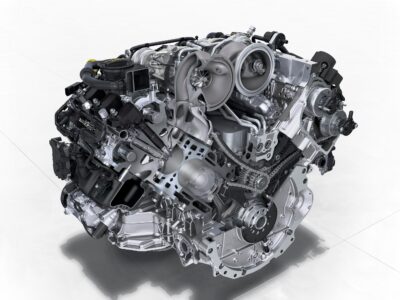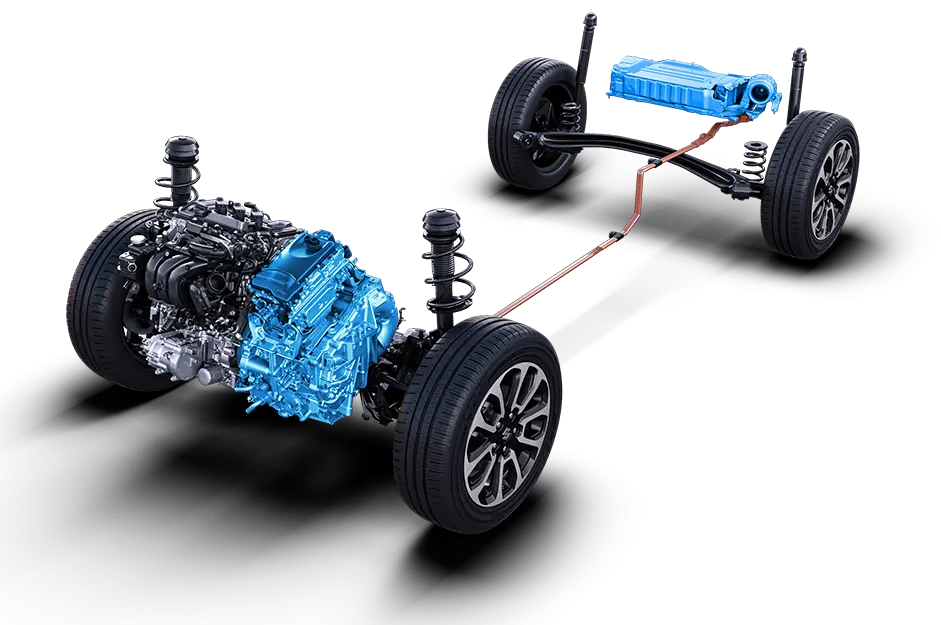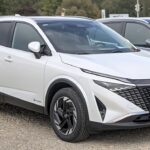
How the Nissan Qashqai Mild Hybrid Works: Complete Technical Breakdown

The Nissan Qashqai Mild Hybrid represents the next evolution of efficient driving — blending smart electrification with familiar petrol performance. Unlike a fully electric or plug-in hybrid model, the Qashqai’s mild hybrid system enhances everyday driving without changing how you refuel or operate your car. In this guide, we’ll explore exactly how the system works, how it improves efficiency, and why it’s one of the most refined hybrid technologies in its class.
- Understanding the Mild Hybrid Concept
- The Core Components of the Qashqai Mild Hybrid System
- How the Nissan Qashqai Mild Hybrid Works Step by Step
- Benefits of the Nissan Qashqai Mild Hybrid System
- Real-World Driving Experience
- Maintenance and Reliability
- Fuel Economy and Performance Figures
- Mild Hybrid vs e-POWER: Key Differences
- Why the Qashqai Mild Hybrid Is a Smart Choice
Understanding the Mild Hybrid Concept
A mild hybrid isn’t designed to drive solely on electric power. Instead, it supports the petrol engine through an integrated electric motor and a compact lithium-ion battery. These components work together to improve fuel efficiency, reduce CO₂ emissions, and deliver smoother power delivery — all without requiring external charging.
In essence, the system recovers energy that would otherwise be lost during braking or deceleration and uses it to assist the engine during acceleration. It’s a seamless, self-charging setup that enhances performance while keeping maintenance simple.
The Core Components of the Qashqai Mild Hybrid System
The Nissan Qashqai’s mild hybrid system relies on several key components that work in harmony to deliver maximum efficiency.
1. 1.3 DIG-T Petrol Engine
At the heart of the system is Nissan’s advanced 1.3-litre DIG-T turbocharged petrol engine, available in 138 hp and 156 hp outputs. It delivers strong low-end torque and quick throttle response while maintaining exceptional refinement and economy.
2. 12V Lithium-Ion Battery
Unlike the larger batteries found in full hybrids or EVs, the 12-volt lithium-ion battery in the Qashqai is lightweight and compact. It stores recovered energy and supplies electrical assistance to the engine and onboard systems when needed.
3. Belt-Driven Starter Generator (BSG)
The Belt-Driven Starter Generator is the system’s powerhouse. It replaces a conventional alternator and acts as both a generator and a small electric motor. It recovers kinetic energy during braking and deceleration, converts it into electricity, and stores it in the battery. Later, it uses that stored energy to support the engine during acceleration.
4. Intelligent Control Unit (ICU)
The control unit constantly monitors driving conditions, battery charge, and energy demand. It automatically manages the transition between energy recovery, battery support, and engine operation to ensure the system runs smoothly and efficiently.
How the Nissan Qashqai Mild Hybrid Works Step by Step
The beauty of the Qashqai mild hybrid system lies in its simplicity and automation. Here’s how it functions during different driving scenarios:
You may be interested in reading Reliability Overview: Where Qashqai Stands Today
Reliability Overview: Where Qashqai Stands Today1. Starting and Idling
When you start the car, the BSG ensures a smoother and quieter ignition compared to traditional starter motors. During idling or when coasting to a stop, the engine can shut down completely, conserving fuel while key systems remain powered by the battery.
2. Acceleration and Cruising
As you press the accelerator, the BSG provides electric torque assist — a brief boost that reduces engine strain and improves responsiveness. This results in quicker acceleration and lower fuel consumption, especially in stop-and-go city driving.
3. Deceleration and Braking
During deceleration, the BSG switches into generator mode, recovering kinetic energy that would otherwise be lost as heat through braking. This energy is then stored in the 12V battery for future use, maintaining a continuous energy loop.
4. Stop/Start Operation
When you stop at traffic lights, the engine automatically shuts off. The battery continues powering systems like air conditioning, infotainment, and lighting. As soon as you release the brake, the BSG restarts the engine instantly and silently, ready to move again without delay.
Benefits of the Nissan Qashqai Mild Hybrid System
The Qashqai’s mild hybrid system is designed to deliver practical, real-world advantages that drivers can feel daily.
1. Improved Fuel Efficiency
By recovering energy and assisting the engine during acceleration, the system reduces fuel consumption by up to 6–8% compared to equivalent non-hybrid engines.
2. Reduced CO₂ Emissions
The hybrid assistance helps lower tailpipe emissions, keeping the Qashqai within tighter European and global emission standards while supporting eco-friendly driving habits.
3. Enhanced Smoothness and Comfort
The mild hybrid system enables quieter engine starts and smoother transitions between idling and acceleration, adding refinement to urban and highway driving alike.
4. No Plug-In Required
Because it’s a self-charging hybrid, there’s no need for charging cables or external power sources — energy recovery happens naturally while you drive.
You may be interested in reading Reliability Overview: Where Qashqai Stands Today
Reliability Overview: Where Qashqai Stands Today Dacia Sandero Dashboard Warning Lights and Meanings (2025 Complete Guide)
Dacia Sandero Dashboard Warning Lights and Meanings (2025 Complete Guide)Real-World Driving Experience
Drivers often describe the Qashqai Mild Hybrid as exceptionally refined and natural to drive. The electric torque assist delivers quicker throttle response, particularly during low-speed acceleration. Meanwhile, the automatic stop/start system works unobtrusively, maintaining comfort while improving economy.
Whether navigating city streets or cruising on the motorway, the mild hybrid seamlessly adapts to your driving style, optimizing performance without any driver input required.
Maintenance and Reliability
The mild hybrid setup in the Qashqai is designed for longevity and ease of ownership.
- Battery durability: The 12V lithium-ion unit is built to last the vehicle’s lifetime under normal conditions.
- Maintenance costs: No complex high-voltage systems mean service intervals and costs are similar to conventional petrol models.
- Reliability: Nissan’s proven hybrid technology has been refined across millions of miles of testing in varying global conditions.
Fuel Economy and Performance Figures
The Qashqai Mild Hybrid achieves impressive efficiency across trims:
| Engine | Transmission | Power | Fuel Economy (Combined WLTP) | CO₂ Emissions |
|---|---|---|---|---|
| 1.3 DIG-T 138 hp | 6-speed Manual | 138 hp | ~45–47 mpg | ~138–144 g/km |
| 1.3 DIG-T 156 hp | Xtronic CVT | 156 hp | ~43–46 mpg | ~140–150 g/km |
These figures demonstrate the system’s ability to balance power and economy effectively, outperforming many non-hybrid SUVs in its class.
Mild Hybrid vs e-POWER: Key Differences
It’s important to distinguish the Qashqai Mild Hybrid from Nissan’s e-POWER hybrid system:
| Feature | Mild Hybrid | e-POWER Hybrid |
|---|---|---|
| Electric-Only Driving | ❌ No | ✅ Yes (Electric motor drives wheels) |
| Battery Type | 12V lithium-ion | High-voltage lithium-ion |
| Charging Method | Self-charging | Self-charging via petrol generator |
| Power Delivery | Petrol + electric assist | Fully electric drive, petrol generator |
| Fuel Efficiency | Moderate improvement | Greater efficiency and torque response |
The mild hybrid is ideal for drivers who want better fuel economy and smoother driving without the complexity of plug-in systems.
Why the Qashqai Mild Hybrid Is a Smart Choice
The Nissan Qashqai Mild Hybrid combines practicality, technology, and efficiency in a single package. Its self-charging nature, refined operation, and improved fuel economy make it one of the most appealing SUVs in its segment. For those who want to reduce running costs and emissions without changing driving habits, the Qashqai mild hybrid offers the perfect bridge between traditional petrol power and full electrification.
Final Verdict
The Nissan Qashqai Mild Hybrid is a masterclass in smart engineering. By blending a responsive petrol engine with intelligent electrification, Nissan delivers an SUV that’s efficient, quiet, and effortless to drive. It doesn’t require charging, yet it brings the benefits of hybrid technology to everyday life — proving that electrified driving can be both simple and satisfying.
You may be interested in reading Reliability Overview: Where Qashqai Stands Today
Reliability Overview: Where Qashqai Stands Today Dacia Sandero Dashboard Warning Lights and Meanings (2025 Complete Guide)
Dacia Sandero Dashboard Warning Lights and Meanings (2025 Complete Guide) Dacia Sandero Dimensions and Boot Space (2021–2025 Full Guide)
Dacia Sandero Dimensions and Boot Space (2021–2025 Full Guide)If you want to know other articles similar to How the Nissan Qashqai Mild Hybrid Works: Complete Technical Breakdown you can visit the category Blog.
Leave a Reply






More content of your interest